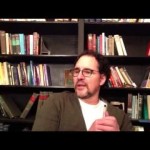We run our website the way we wished the whole internet worked: we provide high quality original content with no ads. We are funded solely by your direct support. Please consider supporting this project.

A Very Brief History of Open Theism
While the open view of the future has always been a very minor perspective, it has had its defenders throughout Church history and it has never been called “heresy” (until in mid 1990s when some started using this label).
According to some African American church leaders, it has been the predominant view in the African American Christian tradition (e.g., in The Color of God: The Concept of God in Afro-American Thought [Mercer Press, 1987]. Major Jones argues that the African Christian experience of oppression has enabled them to seize a dimension of the biblical portrait of God which the classical western tradition missed because of its overemphasis on control and its indebtedness to platonic philosophy).
More research needs to be done on the history of the open view, but my own research thus far has found advocates as far back as the fourth century (e.g., Calcidius). What’s most interesting about Calcidius is that his view is espoused in his Commentary on Plato’s Timaeus, which was used extensively throughout the middle ages. Yet, so far as I’ve been able to discern, no middle scholar thought his view was heretical enough to comment on.
In the early eighteenth century, a man named Samuel Fancourt published an essay entitled Concerning Liberty Grace and Prescience which led to a good deal of discussion about the topic in England. His arguments largely parallel those used by Openness advocates today. Also, it appears that Andrew Ramsay, a contemporary of John Wesley, espoused the teaching that God doesn’t know the future strictly as a domain of settled facts.
The topic was much discussed in the nineteenth century, being advocated by the renowned Bible commentator Adam Clarke, the popular Methodist circuit preacher Billy Hubbard, and some within the Stone-Campbell Restoration movement such T.W. Brents, whose 1874 book The Gospel Plan of Salvation puts the Open View of the future on center stage. This book was widely used as a theology textbook in the Stone-Campbell movement. On top of this, the Methodist professor and chancellor of Ohio Weslyean University, L. D. McCabe, wrote several books espousing Open Theism on biblical as well as philosophical grounds.
At the turn of the century, the view was espoused by Finnis Dennings Dake, author of the famous and influential Dakes Annotated Bible. The view had occasional defenders throughout the twentieth century and became a standard teaching among the early founders of Youth With a Mission.
This is brief (very brief) history only hits the highlights. But it demonstrates that the open view of the future has been a part of historic orthodoxy. The modern expression, propelled in an accessible form through the publication of The Openness of God by Clark Pinnock and others, falls in line with Protestant thought of theological reform. The entire Protestant movement has been rooted in the conviction that the church always needs more reforming, and whether particular theological claims contribute to this on-going reformation or not needs to be tested against Scripture.
Category: General
Tags: History, Open Theism, Theology
Topics: Defending the Open View
Related Reading

5 Observations about God Changing His Mind
One of the most significant passages that supports the open view of the future is found in Jeremiah 18. This is one of the numerous times where we find God changing his mind in response to events. By definition, one cannot change what is permanently fixed. Hence, every time the Bible teaches us that God…

How do you respond to Romans 9?
The Deterministic Interpretation of Romans 9 Many people believe that Romans 9 demonstrates that God has the right and power to save whichever individuals he wants to save and damn whichever individuals he wants to damn. I’ll call this the “deterministic” reading of Romans 9, for it holds that God determines who will be saved…

When the Bible Isn’t Clear
Mark Grapengater via Compfight Roger Olson wrote a post today entitled How to Solve a Theological Dilemma when Scripture Doesn’t Clearly Solve It: An Exercise in Theological Method. The title itself is provocative and problematic if you’re a fundamentalist, so Roger spends some time dealing with the mindset of fundamentalism. This is a really valuable read if…

The Rorschach Test
The choices we make will either increase or decrease our ability to recognize light when we see it. As we choose goodness, we increase our capacity for goodness. What do you see when you read the Bible or look at God or interact with others? Everything is a Rorschach test to some extent, revealing the light…

The Future of Theology
Chris Moore via Compfight Roger Olson recently published a blog arguing that there really are no new ideas out there in the realm of theology. Everything has pretty much been thought of or proposed. That idea or book that’s causing such a stir? Rewarmed material that someone else already thought of. So what is there…
